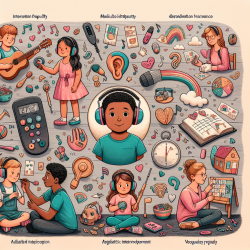Introduction
In the realm of speech-language pathology, particularly in online therapy services like those provided by TinyEYE, performance feedback is a crucial tool for enhancing therapeutic outcomes. However, its effectiveness can be inconsistent due to individual differences and task demands. Recent research by Swift and Peterson (2018) sheds light on how personality traits and task difficulty interact to influence the motivational impact of performance feedback.
Understanding the Research
The study titled Improving the effectiveness of performance feedback by considering personality traits and task demands explores the moderating effects of the Big Five personality traits on performance feedback across different task difficulties. The research found that Conscientiousness and Neuroticism significantly influence how individuals respond to feedback, particularly in tasks that vary in difficulty.
Key Findings
- Conscientiousness and Neuroticism: Individuals high in these traits are more sensitive to feedback, with negative feedback on playful tasks boosting motivation, while the same feedback on difficult tasks can be demotivating.
- Task Difficulty: Feedback's impact varies with task difficulty. Playful tasks enhance motivation with negative feedback, whereas difficult tasks can diminish it.
- Agreeableness: Positive feedback is more motivating for agreeable individuals, especially in playful tasks.
Implications for Practitioners
For speech-language pathologists, understanding these dynamics can significantly enhance therapy outcomes. Here are some actionable insights:
- Tailor Feedback: Customize feedback based on the client's personality traits. For conscientious and neurotic clients, emphasize positive aspects in difficult tasks to prevent demotivation.
- Task Framing: Frame tasks as playful to leverage the motivating effects of negative feedback, especially for conscientious and neurotic individuals.
- Feedback Timing: Provide feedback immediately after tasks to maximize its motivational impact.
Encouraging Further Research
While this study provides valuable insights, further research is encouraged to explore the nuances of personality traits in therapeutic settings. Practitioners are invited to consider these findings and adapt them to their unique contexts, contributing to a growing body of knowledge that enhances therapy efficacy.
Conclusion
By integrating personality traits and task demands into feedback strategies, speech-language pathologists can improve motivation and outcomes in therapy sessions. This approach not only personalizes therapy but also aligns with data-driven decision-making, fostering better results for children.
To read the original research paper, please follow this link: Improving the effectiveness of performance feedback by considering personality traits and task demands.










